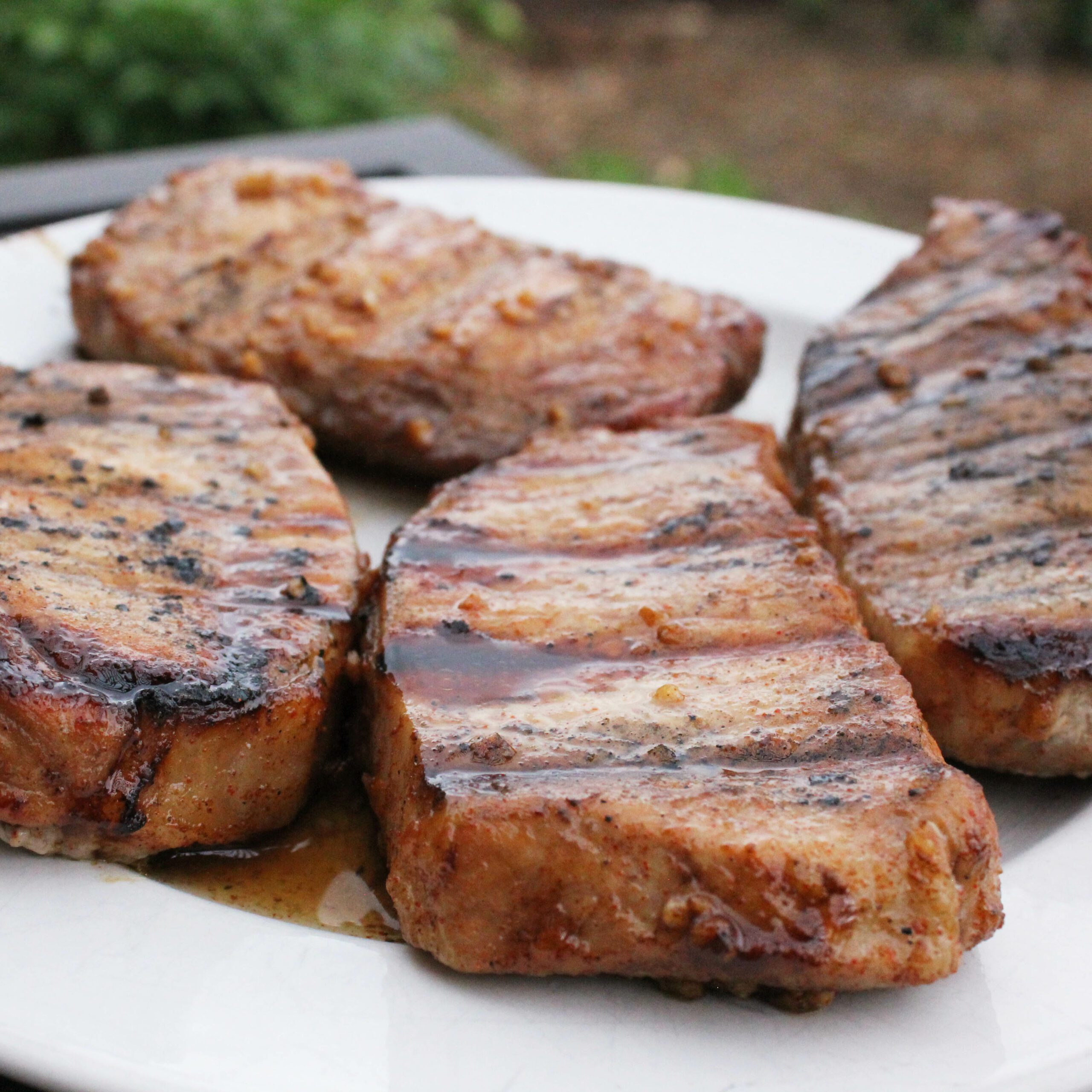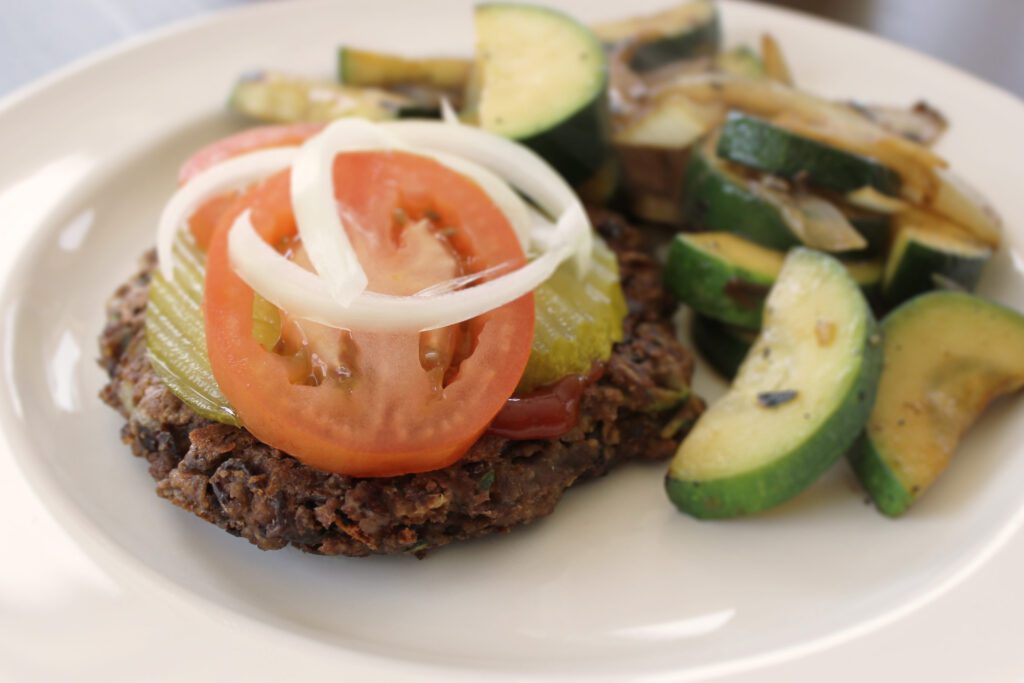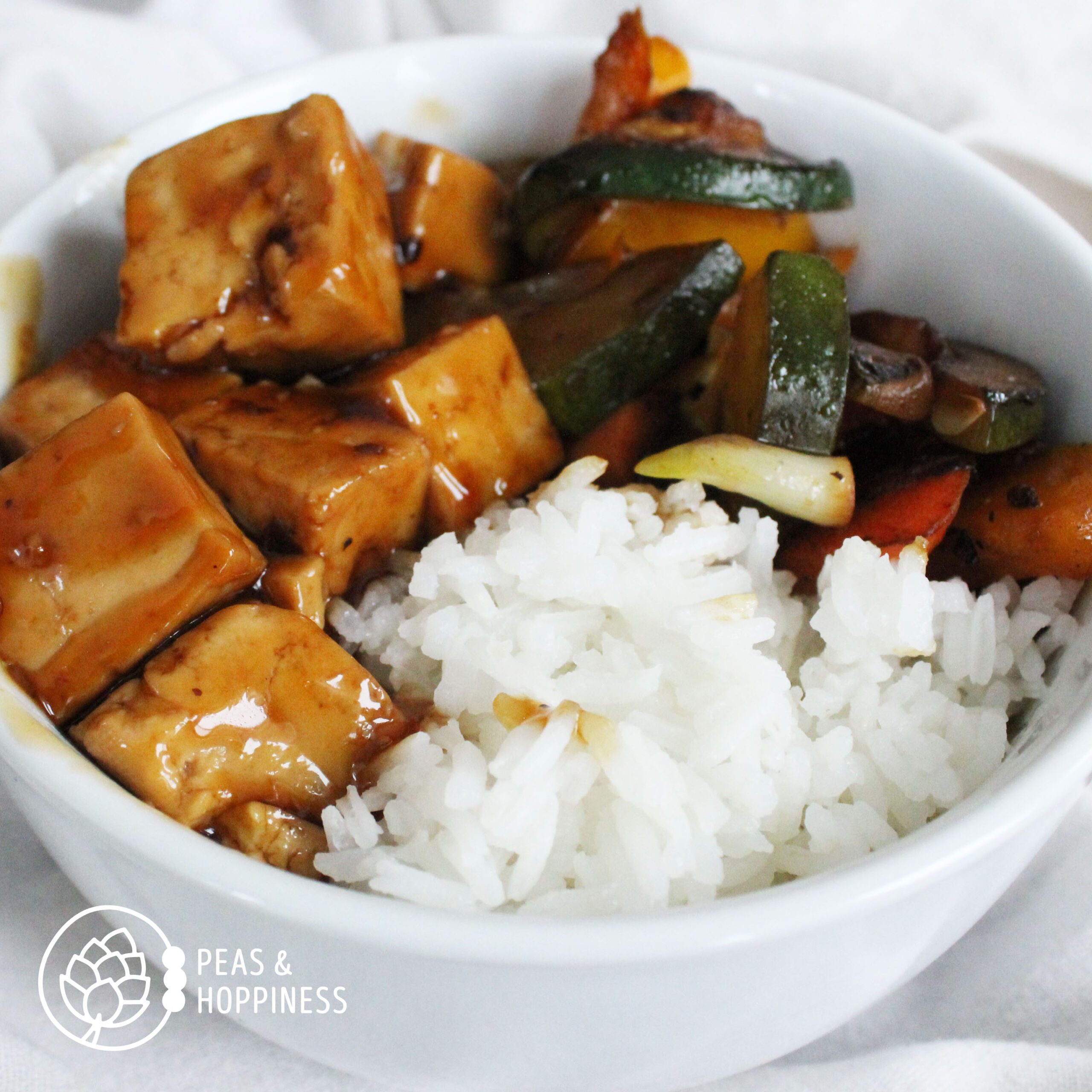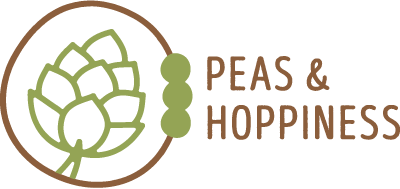Are you getting too much protein? Too little? Learn how much protein you need depending on your goals and stage of life.
 There is a lot of talk about protein these days – and a lot of different opinions on how much protein you need.
There is a lot of talk about protein these days – and a lot of different opinions on how much protein you need.
The true answer about protein needs depends on a variety of factors: including your personal health, your goals, and the protein sources in your diet.
Read on to understand why protein intake recommendations are so confusing, what factors affect your protein needs, how much protein you need in a day, and how to ensure you’re eating a balanced diet.
Tired of worrying about the nutrition of your meals? Let a registered dietitian plan them for you!
Download the Peas and Hoppy Meal Guides App
Why Protein Intake Recommendations Are So Confusing
There are many reasons for conflicting information about requirements for protein intake.
First, the answer about protein needs depends on your goals. For example, are you interested in the minimal protein necessary to prevent malnutrition? Or are you looking for optimal nutrition? Optimal for what? Disease prevention? Muscle health? Longevity?
Secondly, the amount of total protein you need depends on where your protein comes from. If you get your protein from animal sources you usually don’t need as much overall protein. This is because animal proteins contain the essential amino acids in the ratio our bodies need.
However, if you eat a plant-based diet, it may be better to aim for a higher overall protein amount. You also need to eat a variety of complementary proteins to get the right ratio of amino acids. Legumes are high in certain amino acids while grains are high in the opposite ones.
Lastly, your protein needs vary based on a multitude of factors. There is not a one-size-fits-all answer when it comes to protein needs, which means many people will have different opinions on this topic.

Factors That Affect Your Protein Needs
A few of the factors that affect your protein needs include: the stage of life you’re in, hormonal changes, disease states, weight loss, or muscle gain.
Health Factors Affecting Your Protein Needs
 The main health factors to consider when determining your protein needs are your stage of life and if you have any underlying medical conditions.
The main health factors to consider when determining your protein needs are your stage of life and if you have any underlying medical conditions.
Stage of Life: for women especially, during menopause and perimenopause, daily protein intake should be at least 1 – 1.2 g/kg body weight. Combined with resistance training, this helps preserve skeletal muscle and metabolism. Protein intakes higher than 1.5-2.0 g/kg body weight are not recommended as this can increase risk of fractures. (doi: 10.3945/ajcn.114.084053)
Note: the isoflavones from soy proteins may be beneficial for women in menopause to reduce symptoms of hot flashes. Read more about the benefits of soy.
Underlying Medical Conditions: If you have Chronic Kidney Disease, you may need to limit your protein intake. Work with a registered dietitian who specializes in kidney disease to determine your unique protein goals.
Lifestyle Factors Affecting Protein Needs
Catabolism is the process of breaking something down, such as weight loss. Anabolism is the process of building something up, such as muscle gain. In either case, you need to consume adequate protein for your body.
Weight Loss: Almost by definition, the process of weight loss is going to include some muscle loss. To prevent losing muscle, a combination of higher protein PLUS resistance training is the bet way to preserve lean muscle. Aim for 1.0-1.2 grams of protein per kilogram body weight during weight loss. (doi: 10.3945/an.116.014506)
Muscle Gain: To increase muscle, higher protein intake plus strength training is needed. The American College of Sports Medicine recommends aiming for 1.2-1.7 grams of protein per kilogram body weight for athletes training to build muscle.
Dietary Factors Affecting Your Protein Needs
 Protein is made of 20 different amino acids. Of these, 9 are essential amino acids meaning our body can’t make them, so we have to eat them.
Protein is made of 20 different amino acids. Of these, 9 are essential amino acids meaning our body can’t make them, so we have to eat them.
If we’re missing all but one of those 9 essential amino acids, our body won’t be able to synthesize the muscle proteins until we eat enough of that missing amino acid. This means that it’s important to eat all of the essential amino acids in the ratio our body uses them.
Animal sources of protein and soy contain the essential amino acids close to the ratio we need them in our body. Other plant proteins tend to lean towards one half or the other.
For plant-based eating, be sure to include complementary grains and legumes to maintain the proper amino acid ratio. To be safe, aim on the high end of your target to make sure you have the minimum necessary of all nine essential amino acids.
So, How Much Protein Do You Need in a Day?
The answer to how much protein you need in a day depends on your unique situation. To best answer this question, you need to speak with your doctor or dietitian.
Here is a basic guideline to help you determine where you should aim for:
Minimum protein necessary: The RDA (Recommended Daily Allowance) is set at 0.8 grams of protein per kilogram body weight to prevent protein deficiency.
Most Healthy Individuals (includes peri-menopause, menopause, light exercise, losing weight): Aim for 1.0 – 1.2 grams of protein per kilogram of body weight
Higher Protein Needs (includes strength training, vigorous exercise, plant-based): Aim for 1.2 – 1.7 grams of protein per kilogram of body weight
Low Protein Diet (Chronic Kidney Disease; recommendations vary based on stage and type of dialysis): 0.23 – 0.8 grams of protein per kilogram body weight. You need to work with a dietitian to determine your unique protein needs.

Can You Eat Too Much Protein?
Yes, there is such a thing as too much protein! The safe upper limit of protein intake has been established at 3.5 grams of protein per kilogram body weight. However, for the long-term, it’s recommended not to exceed 2 grams of protein per kilogram body weight.
Protein intakes chronically higher than 2 g/kg body weight may lead to digestive, kidney, and vascular issues. Eating this much protein for a few weeks is likely fine, but in the long term you should probably keep protein intake below 2 grams of protein per kg body weight.
Protein Intake and Longevity are Inversely Related
 In the body, growth is often counter to anti-aging. That means when pathways for growth are turned on – such as is needed for building muscle – this also turns on pro-aging pathways.
In the body, growth is often counter to anti-aging. That means when pathways for growth are turned on – such as is needed for building muscle – this also turns on pro-aging pathways.
Eating high amounts of protein turns on growth pathways, which inherently turns on pro-aging pathways. The exact level at which these pathways are turned on is unclear, but probably happens somewhere between 1.2 – 1.5 g/kg body weight, or when someone consumes more than 25-30 grams of protein in one sitting.
Thus, if your goal is muscle gain, you need to be eating this much, but it’s likely not best for the long-term.
Instead, consider aiming for a moderate protein intake most of the time, then only increase protein intake for short periods of training.
Note: the caveat to this is that after age 65, muscle becomes so important for longevity that consuming a slightly higher protein intake may be helpful for healthy, longer living.
Thanks to Hannah Van Ark, MS, RDN for her input on protein and longevity.
How to Ensure You Get Enough (But Not Too Much) Protein in Your Diet
You don’t need to count every gram of protein or measure every portion to make sure you’re getting enough protein.
Instead, focusing on a balanced plate is one of the simplest and most effective ways to reach your protein goals.
 At most meals, your plate should consist of:
At most meals, your plate should consist of:
- ¼ protein source
- ¼ starch
- ½ fruits & vegetables
It’s okay if not every meal looks like this. Aim for this balance over the course of the day to ensure you’re getting the nutrition you need.
In addition to protein, our bodies also need healthy fat, fiber, vitamins, minerals, and phytochemicals. These nutrients are found in different foods than where protein is traditionally found. Eating a variety of food is essential to meet your needs!
If you’d like a clearer answer to the question of what to eat, start a free trial of our meal planning app: The Peas and Hoppy Meal Guides.
Every week we’ll send you a menu with 10 fresh meal ideas that are balanced nutritionally – including enough protein AND all the other nutrients that are important for health.
Click here to start your free trial of premium and enjoy stress-free, delicious, and nutritionally balanced meals!
Happy healthy protein eating,
Dietitian Ann
Balanced Nutrition Made Easy (And Yummy)
Download the Peas & Hoppy Meal Guides App and get the right nutrition on the table for your family while enjoying delicious meals, reducing food waste, and saving money at the grocery store.
Premium subscribers get a new planned-for-you menu every week complete with recipes and a customizable grocery list. We make mealtime easy (and fun!) again!
“The Meal Guides app helps me reliably provide new, delicious, and healthy meals for my busy family every week.”
-Lori, Working Mom of Two and Premium Subscriber of the Peas and Hoppy Meal Guides App

